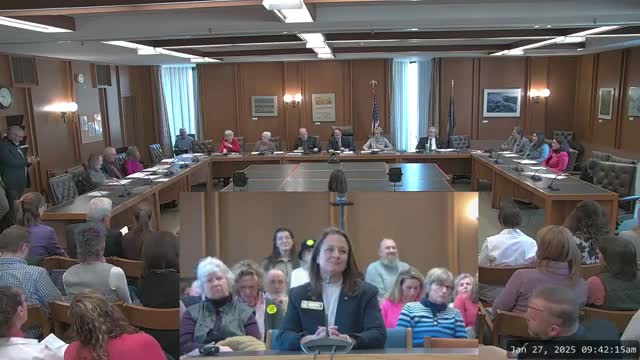House Judiciary Committee hears hours of testimony on 15-week abortion ban and a companion reporting amendment
Get AI-powered insights, summaries, and transcripts
Subscribe
Summary
Chairman Lynn opened a public hearing on House Bill 476, a proposed 15‑week abortion limit, and a non‑germane reporting amendment after Representative Katie Petterno said she had asked to withdraw the bill; the committee nonetheless heard hours of testimony from clinicians, advocates and residents and recessed action until Feb. 19.
House Judiciary Committee Chairman Lynn opened a public hearing on House Bill 476, a proposed law that would limit most abortions to 15 weeks of pregnancy, and on a non‑germane amendment that would require state reporting on induced terminations.
Representative Katie Petterno, the bill’s prime sponsor, told the committee that she had submitted a request to withdraw HB 476 to the House clerk, but Chairman Lynn said the committee would still hold the hearing because a formal withdrawal requires approval by the full House and, as he explained, “the sponsor and all of the cosponsors have to agree, and then the matter has to go to the House floor for a vote” (which he said could not occur earlier than Feb. 6). The hearing proceeded with public testimony.
Why this matters: The measure would lower New Hampshire’s current 24‑week threshold mentioned in testimony to 15 weeks and would add a state reporting requirement for induced terminations. Testimony linked the proposed limit to potential changes in clinical care, provider availability and patient outcomes, and speakers on both sides said the bill would have political as well as medical effects.
Medical providers who testified against HB 476 described clinical and timing realities that, they said, make a 15‑week cutoff harmful. Doctor Cynthia Rasmussen, a retired obstetrician‑gynecologist, told the committee, “First and foremost, women will die unnecessarily.” Doctor David Crowley, a pediatric and fetal cardiologist, said the bill “will remove the informed from the informed consent process. It will insert a party that has no place to make this type of medical decision.” Multiple OB‑GYNs, midwives and nurses described situations—complex fetal diagnoses, late‑presenting pregnancy complications and travel barriers—where they said patients need care after 15 weeks.
Speakers who supported the bill argued a 15‑week limit would protect fetal life and cited moral and scientific language about embryonic development. Supporters urged the committee to let the bill proceed to a floor vote so the full House could decide. Attorney Ian Hewitt, speaking for Cornerstone, said a 15‑week standard is seen by many voters as an acceptable compromise and urged the committee not to block the bill from reaching the floor.
The amendment: Representative Bob Lynn introduced a non‑germane amendment (2025‑0031H) to require annual state reporting on induced terminations. The amendment would direct the Department of Health and Human Services (DHHS) to compile an aggregate report and to receive data from providers; it also included a provision, as presented, that would allow fines for providers who “knowingly or recklessly” fail to report. Planned Parenthood and DHHS representatives said they do not oppose the concept of collecting data but objected to the amendment as drafted, citing confidentiality, HIPAA compliance and technical costs.
DHHS officials and the division that handles vital records told the committee the amendment lacks detail about funding, data systems and legal authority for handling protected health information. The department estimated an initial cost for DHHS of roughly $150,000 in staff resources plus $10,000 for training to implement the kind of reporting described in testimony and identified a separate, larger estimate tied to related draft legislation discussed in the Senate that could exceed that amount.
Privacy and process concerns dominated much of the amendment discussion. Planned Parenthood said it already provides aggregated data to national researchers such as the Guttmacher Institute and that any New Hampshire system should accept aggregated inputs and use a HIPAA‑secure portal similar to systems in neighboring states. DHHS and other witnesses warned that New Hampshire’s relatively low volume of later‑term procedures raises the risk that overly granular public data could enable re‑identification of patients or providers in small communities.
Procedure and next steps: Chairman Lynn closed the public portion of the hearing on HB 476 and immediately opened hearing testimony on the amendment. After extended discussion about timing and next steps, the chairman recessed committee action on both the bill and the amendment and said the committee would reconvene executive session on February 19. No committee vote on either the bill or the amendment occurred during the meeting.
What was not decided: The transcript shows no committee vote on HB 476 or the reporting amendment. The sponsor’s request to withdraw the bill remains before the House clerk and, per testimony by Chairman Lynn, would require action by the full House to be effective. The committee did not take a final recommendation on the bills at this meeting.
For the record: Testimony included more than a hundred speakers from clinicians, nurses, clergy, nonprofit and advocacy organizations, legal advocates and residents. Organizations that testified or were referenced included Dartmouth Health, Planned Parenthood Northern New England, the New Hampshire Medical Society, Equality Health Center, Reproductive Equity Now and the Guttmacher Institute. DHHS officials highlighted fiscal and technical constraints to immediate implementation of large‑scale reporting.
The committee’s next procedural step was to recess the executive session and reconvene on Feb. 19; whether the House will accept the sponsor’s withdrawal before that date remains a separate, pending action by the full House.
